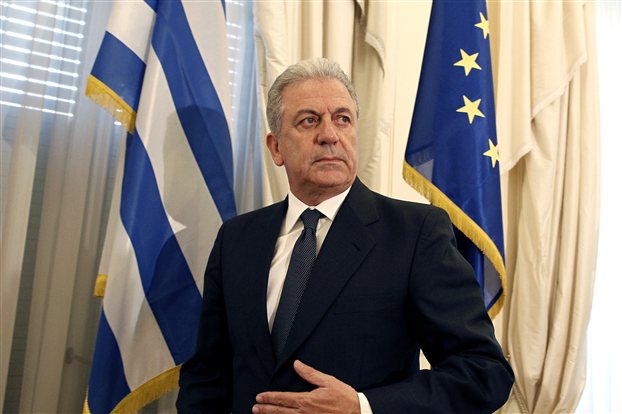Ο επίτροπος κ. Δημήτρης Αβραμόπουλος καλωσορίζει το νέο έτος με μία πρόσκληση για ευρωπαϊκή πολιτική ενότητα και εκμετάλλευση των ιστορικών ευκαιριών που προσφέρει η κρίση.
Belgium | Brussels: History teaches us that major political progress is usually achieved in the midst of or after crises. Let us not forget that the European idea was born out of the ruins of the Second World War and founded in the insecurity and fear of the Cold War.
So now, almost 58 years after the signing of the Treaty of Rome, Europe is called on to tackle a crisis of confidence of its growth capacity and to face the very serious geopolitical instability developing in its immediate neighbourhood.
The response to the manifold crisis facing Europe can only be the continuation of its historic path. The political union of Europe is today more than just a historic necessity. It constitutes the only realistic and practical response to the challenges that must be confronted head on.
Decades of institutional inertia and lack of political will followed the fall of the walls that divided our continent and the frenzied globalisation that eliminated the barriers in human communication and economic activity. Decades of stagnation, where European leaders lacked the courage to take decisive steps toward political integration, economic governance, research and innovation, and the development of a truly common European foreign and defence policy.
In a genuinely global era, we did not dare to admit that European nation states could not successfully cope on their own with challenges that surpass their capabilities. This weakness soon left us lagging; Europe fell behind. For the first time in world history, Europe witnessed other regional powers – what used to be called the developing world – exceeding its pace of innovation and progress.
Europe cannot and must not close its borders to the movement of human capital.
The crisis we are facing today is not the result of a 'bloated Europe', as all those who fear the inevitability of progress would claim. It is the result of 'less Europe', of a Europe that has not developed a fundamentally convincing narrative for its place on the world stage.
Yet today, the crisis offers unique historic opportunities in the progression toward political union. It is the first time, perhaps in the history of European integration, where specific geopolitical interests are uniting politically the European family.
The instability in our immediate neighbourhood, from the shores of North Africa to the Black Sea, dictates the need for closer cooperation at the EU level and the development of concrete European solutions and tools to safeguard Europe.
The management of global migration flows, is a new challenge that requires a convincing European response. The phenomenon of uncontrolled migration, which is expected to worsen owing to the explosive geopolitical environment could, in the long-term, test the cohesion of European societies.
As I have repeatedly stated, from the moment I became Commissioner for Migration, Home Affairs and Citizenship, a “Fortress Europe” is not the solution. This prospect leads inevitably to the abolition of key European achievements, such as the Schengen Treaty. It leads to isolation. The solution is to develop a genuine European migration policy, based on solidarity between EU Member States.
Europe cannot and must not close its borders to the movement of human capital. However, it can and should, also for the sake of safeguarding fundamental rights, control effectively what is happening at its common borders.
The protection of Europe's common borders becomes all the more important as a result of the emergence of new forms of crime and the spread of the phenomenon of 'foreign fighters', i.e. citizens who choose to leave Europe to fight in terrorist and bigoted organisations. And on this issue, nation states cannot on their own guarantee the security of their citizens. There is a need for greater cooperation, more exchange of information and know-how, stronger European security mechanisms.
Today, European citizens are again confronted with fear and insecurity. Insecurity and fear underpin the existence of the forces that are investing in the dissolution of the European Union. Therefore, we have a responsibility:
- to overcome the inertia by opening up new horizons for the European vision;
- to take the necessary political leaps forward to break the vicious cycle of institutional and economic stagnation;
- to put Europe back on course of its historic development and to provide security, growth and optimism to the citizens;
- to once again inspire the European consciousness on the basis of our common historical origins.
The New Year will be critical for Europe and for the European cause.
Europe will either move forward towards its political destiny or will experience further erosion of the legitimacy of its cause and institutions.
This time history will not forgive inertia and stalemate.
The stakes are high.
Πηγή: NEWEUROPE.BE


Δεν υπάρχουν σχόλια για το άρθρο "Μία νέα πορεία για την Ευρώπη"